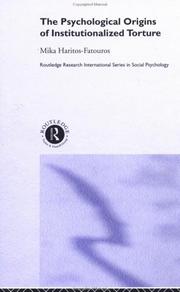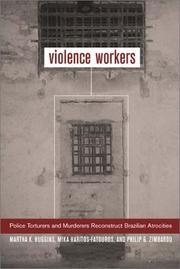| Listing 1 - 2 of 2 |
Sort by
|

ISBN: 0203714997 1283886383 1135646643 9781135646646 9780203714997 0415282764 9780415282765 9781135646783 1135646783 9781135646714 1135646716 9781138880269 1138880264 9781283886383 Year: 2003 Volume: 4 Publisher: London ; New York : Routledge,
Abstract | Keywords | Export | Availability | Bookmark
 Loading...
Loading...Choose an application
- Reference Manager
- EndNote
- RefWorks (Direct export to RefWorks)
Original research, including interviews with former Greek torturers, is supplemented by discussion of former studies, military records and other sources, to provide disturbing but valuable insights into the psychology of torture. The book describes parallel situations such as the rites of passage in pre-industrial societies and cults, elite Corps military training and college hazing, eventually concluding that the torturer is not born, but made.Of essential interest to academics and students interested in social psychology and related disciplines, this book will also be extremely valuable
Torture --- State-sponsored terrorism. --- Cruelty --- Punishment --- Extraordinary rendition --- Government violence --- Governmental violence --- State-sponsored violence --- State terrorism --- Violence, Governmental --- Violence, State-sponsored --- Political atrocities --- Terrorism --- Psychological aspects.

ISBN: 9786612356865 1282356860 0520928911 1597349798 9780520928916 9781597349796 9780520234475 0520234472 0520234464 9780520234468 6612356863 9781282356863 Year: 2002 Publisher: Berkeley University of California Press
Abstract | Keywords | Export | Availability | Bookmark
 Loading...
Loading...Choose an application
- Reference Manager
- EndNote
- RefWorks (Direct export to RefWorks)
Of the twenty-three Brazilian policemen interviewed in depth for this landmark study, fourteen were direct perpetrators of torture and murder during the three decades that included the 1964-1985 military regime. These "violence workers" and the other group of "atrocity facilitators" who had not, or claimed they had not, participated directly in the violence, help answer questions that haunt today's world: Why and how are ordinary men transformed into state torturers and murderers? How do atrocity perpetrators explain and justify their violence? What is the impact of their murderous deeds-on them, on their victims, and on society? What memories of their atrocities do they admit and which become public history?
Torture --- Political atrocities --- Police brutality --- Atrocities --- Brutality by police --- Excessive force used by police --- Excessive use of force by police --- Police use of excessive force --- Use of excessive force by police --- Police misconduct --- Brutalités policières --- Atrocités politiques --- Police violence --- Violence --- 1980s. --- brazil. --- brazilian history. --- brazilian police. --- brazilian. --- contemporary. --- crime. --- criminals. --- cultural history. --- cultural studies. --- execution. --- government. --- masculinity. --- military history. --- military state. --- modern world. --- murder. --- police violence. --- power. --- public history. --- reconstruction. --- social history. --- social studies. --- south america. --- torture. --- world history.
| Listing 1 - 2 of 2 |
Sort by
|

 Search
Search Feedback
Feedback About UniCat
About UniCat  Help
Help News
News